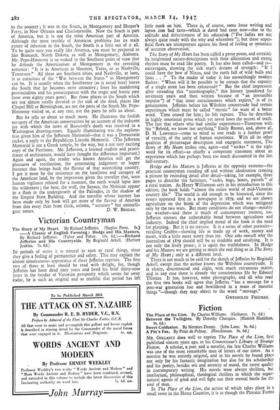Victorian Countryman
Irr periods of stress it is natural to turn to rural things, since they give a feeling of permanence and safety. This may explain the • almost simultaneous appearance of three Jefferies reprints. The first two of these at least should be read with delight, for though Jefferies has been dead sixty years and lived his brief thirty-nine years in the heyday of Victorian prosperity which seems far away today, he is such an original and so truthful that period has left little mark on him. There is, of course, some loose writing and lapses into bad taste—which is dated bad taste now—due to the solitude and defectiveness of his education (" For .ladies are not always quite ready with the why and wherefore"); but these super- ficial flaws are unimportant against his flood of feeling or mountain of accurate observation.' - The Story of My Heart has been called a prose poem, and certainly its heightened nature-descriptions with their alliteration and strong rhythm must be read like poetry. It has also been called—and is— extravagant, showing the sick man's dreams of strength : "If I could have the bow of Ninus, and the earth full of wild bulls and lions . . ." To the reader of today it has astonishingly modern flashes : "When will it be possible to be certain that the capacity of a single atom has been exhausted?" But the chief impression after rereading this "autobiography," this history (pondered for seventeen years and then written because of "an irresistible impulse ") of "that inner consciousness which aspires," is of its genuineness. Jefferies before his Wiltshire countryside had certain experiences which must be called " mystic " for want of a better word. Time ceased for him ; he felt rapture. This he describes in highly emotional prose which yet never loses the accent of truth. The fact that others who had similar experiences—Tennyson with his "Behold, we know not anything," Emily Brontë, and, above all, D. H. Lawrence—come to mind as one reads is a further proof of veracity, of the unity of human experience. With all its other qualities of picturesque description and energetic statement, The Story of My Heart strikes one, again—and "strikes" is the right word for its effect—as chiefly a competent statement about an experience which has perhaps been too much discounted in the last half-century.
Hodge and his Masters is Jefferies at the opposite extreme—the practical countryman standing off and without idealisation creating a picture by recording detail after detail—taking, for example, three pages to describe the furniture, "sacks, bags, boxes parcels" of a rural Station. As Henry Williamson says in his introduction to this edition, the book holds "almost the entire world of mid-Victorian country life." The world is old enough to be historical, since the essays appeared first in a newspaper in 1879, and we are shown agriculture on the brink of the depression which was mitigated only by the two wars. But many conditions do not change—notably the weather—and there is much of contemporary interest, too. Jefferies stresses the unbreakable bond between agriculture and industry. Indeed the chief implied moral of the book is the need for planning. But it is no treatise. It is a series of sober portraits— recalling Crabbe—showing life as made up of work, money and meals, with a little more worry than joy. One asks oneself why the journalism of 1879 should still be so readable and satisfying. It is not only the lively prose; it is again the truthfulness. In Hodge and his Masters we are getting as much the real thing as in The Story of My Heart ; only at a different level.
There is not much to be said for the sketch of Jefferies by Reginald Arkell, except that the author knows the Wiltshire countryside. It is chatty, disconnected and blight, with much extraneous matter, anci in any case there is already the conscientious life by Edward Thomas. It has, however, some photographs and all who read the first two books will agree that Jefferies "has a message for a post-war generation lost and bewildered in a maze of material things "—though they may object to the word "message."
GWENDOLEN FREEMAN.


































 Previous page
Previous page